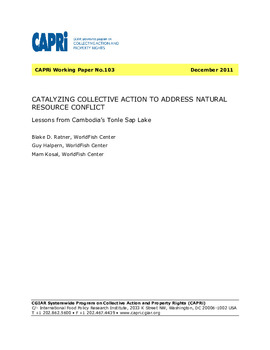Catalyzing collective action to address natural resource conflict: lessons from Cambodia's Tonle Sap Lake

Citation
Ratner, B.D.; Halpern, G.; Kosal, M. (2011). Catalyzing collective action to address natural resource conflict: lessons from Cambodia's Tonle Sap Lake. CAPRi Working Paper no. 103. International Food Policy Research Institute, Washington D.C. 25 p.
This paper reports on outcomes and lessons learned from a 15-month initiative aimed at strengthening collective action to address natural resource conflict in Cambodia’s Tonle Sap Lake. Employing the Appreciation-Influence-Control (AIC) model of participatory stakeholder engagement, the initiative aimed in particular to build collective understanding of the sources of vulnerability in fisheries livelihoods and to catalyze efforts to support resilience in this valuable and productive socialecological system. Outcomes include important shifts in fishery access rights and resource management authority—notably the transfer of a large, commercial fishing concession to community access, and the resolution of a boundary dispute involving community fishery organizations in neighboring provinces. Motivated by such successes in collaborative problem analysis and advocacy, the main national grassroots network representing fishing communities have also modified its internal governance and strategy of engagement to emphasize constructive links with government and the formal NGO sector. The experience demonstrates the potential of such an open-ended process of action research to enable collective action and improve natural resource governance, even amidst ongoing resource conflict. We conclude with a set of lessons learned to guide such efforts in practice.
Permalink
Date Available
Type
Countries
Research Themes
Language